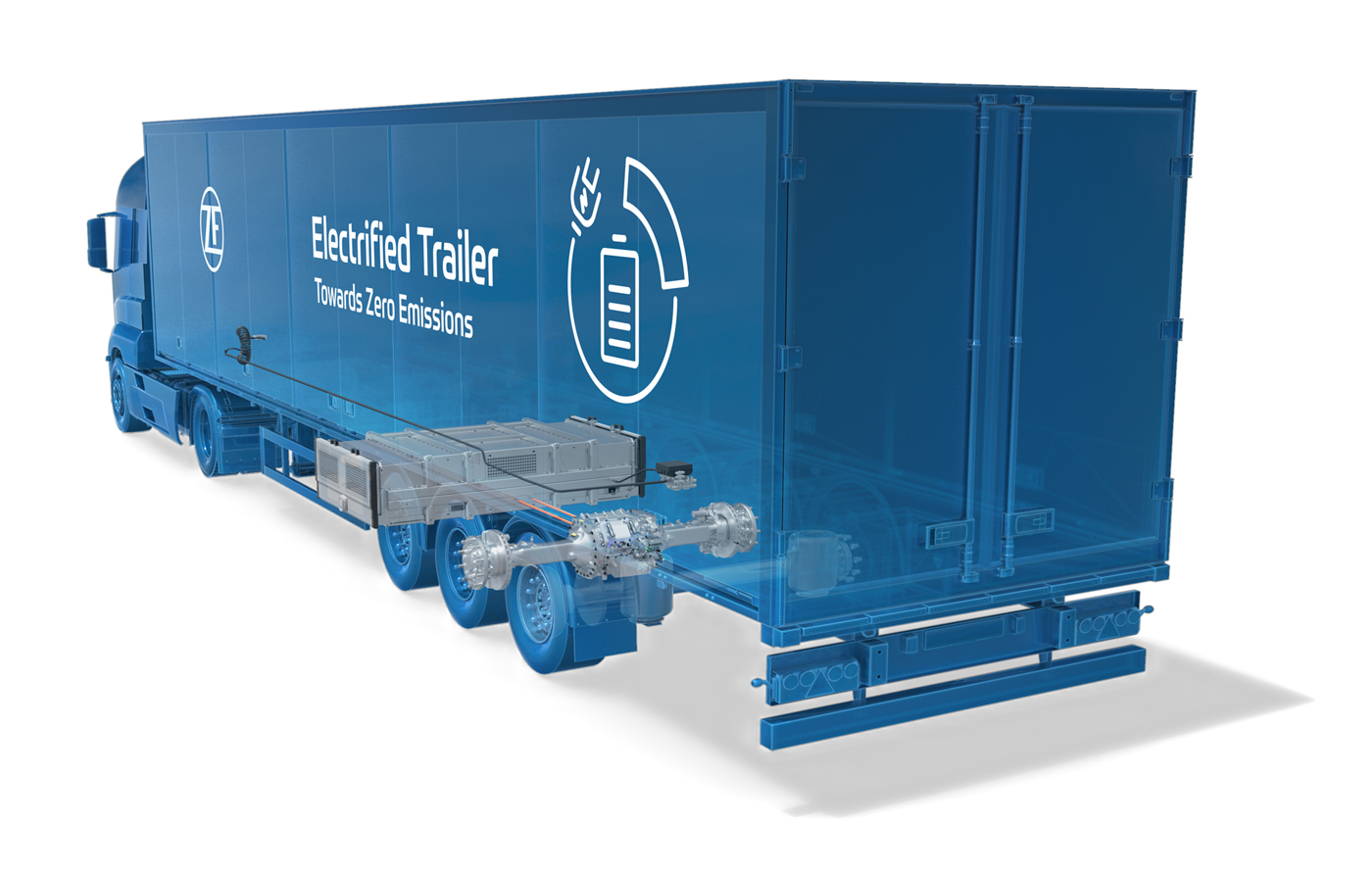A battery bank could make a huge difference
A battery bank could make a huge difference
The world is moving towards battery-electric vehicles (BEVs) and alternative fuels, with good reason. Engines aren’t the only components that can benefit from electrification, though.
German multinational engineering and technology company Bosch already highlighted the benefits of electrified semitrailers back in 2018. It presented an electrified axle at the IAA commercial vehicle show in Hannover that year, which could be integrated into these truck-towed transporters. The idea behind it was quite simple: integrate an electrical machine into the semitrailer’s axles, instead of simply allowing them to roll freely, as had been the case up to then. That meant they could generate electricity during braking and feed it into the trailer’s power units.
In the case of a refrigerated trailer, Bosch estimated that the saving could be as much as €10,000 a year. Bosch calculated that operating the cooling unit using power generated in this way could save up to 9,000 litres of diesel a year, while an electrical start and acceleration boost function could save additional fuel.
“Bosch is making trucks’ rear axles electric and smart. Our electrification solution for trucks makes economic sense and shows how electromobility can work even in today’s [diesel powered] trucks. Bosch’s electrified axle makes trailers independent. By electrifying trailers, Bosch is taking an important step toward automated parking at freight depots,” said Dr Markus Heyn, member of the Bosch board of management.
“They also facilitate remote-controlled electric driving on private property such as freight companies’ premises or at ports. Up to now, truckers have had to do this task themselves, or a special trailer-shunting unit has done it for them,” he continued.
“Now, however, the electric motor makes the trailer into an independent vehicle that can travel short distances. With the help of additional sensors attached to the trailer and installed at various points in the depot, it will be possible for goods trailers to park themselves.”
Bosch isn’t the only company that is going the electrified semitrailer route. ZF’s latest version of its own concept to electrify trailers was on show at the NUFAM commercial vehicles trade show in Karlsruhe, Germany, in the third quarter of last year. Here, the company announced a cooperation with BPW to offer a fully integrated running gear system for trailer builders, including ZF’s AxTrax 2 electric axle.
“Electrification for trailers is an innovative solution to decarbonise road freight transport in the very near future,” noted Dr Bernd Meurer, who is responsible for the electric trailer programme at ZF. “Instead of solely being pulled by the truck, [this] approach provides additional traction while generating fuel savings, reducing CO2 emissions and improving sustainability.”
The company highlighted that its AxTrax 2 electric axle, with a modular battery system box for recuperation and traction support, effectively converts an extra-heavy commercial diesel truck into a hybrid vehicle. It can generate up to 16% fuel and CO2 savings, while the optional plug-in variant saves up to 40%. The trailer also provides benefits for zero-emissions electrified heavy trucks by extending their range.
“The fact that industry leaders are embracing our system demonstrates that we have taken the right concept approach in developing a lightweight and modular system that can be adapted to suit the diverse requirements and various applications of manufacturers and fleet operators,” Meurer added.

Kässbohrer and Krone, two leading German trailer manufacturers, will start to implement ZF´s electrification system into their platforms. “Very early on, Krone investigated and invested in possible options for trailers to provide electrified traction support as a way towards meeting decarbonisation targets of road transport. We are happy to see that well-established partners of the industry, like ZF and BPW, [are teaming] up to support the transformation to more sustainable logistics by offering innovative solutions that we as trailer OEMs can integrate into our trailer systems. At Krone we are convinced that we can only meet the challenges of the future together,” said Dr Stefan Binnewies, a board member of the Krone Group.
“Every trailer needs a chassis, suspension, and braking technology that can be trusted. With our axles for 7.5-tonne trucks and the generator axles for reefers, we already have a lot of experience regarding the integration of electric drives,” said Thore Bakker, general manager of BPW’s trailer solutions and mobility services business unit. “It therefore makes perfect sense that ZF, with expertise in drivelines, cooperates with BPW to offer a robust and highly engineered running gear solution, with the AxTrax 2 axle for recuperation and traction support for semitrailers that can be easily assembled by trailer builders.”
The benefits of electrified trailers have also been verified by third-party testers. Range Energy, a US-based company that also aims to deliver electrified trailers to the commercial trucking market, recently announced that its technology enables up to 36.9% fuel efficiency gains for semi-trucks. Testing was conducted on a 25.5-mile (40.8-km) urban/highway loop at approximately 59,000lbs (nearly 26.8t) gross vehicle mass, and 60mph (nearly 100km/h) top speeds across multiple scenarios including stop/go and steady-speed portions.
The fuel economy testing conducted by Mesilla Valley Transportation Solutions (MVTS), a company that provides breakthrough testing, design, and development services for the trucking industry, demonstrates meaningful progress towards rapidly reducing the emissions of the commercial trucking sector, as well as helping fleet operators meet emerging emissions reductions targets and bring down their cost-per-mile regardless of their duty cycle.
“Achieving 36.3% efficiency improvements proves to the trucking industry how important and overlooked trailers are to enhancing efficiency and lowering emissions for our industry. Range is the first electrification platform to actually prove this level of efficiency benefit, and we anticipate these numbers will only improve as we begin testing with production quality parts versus prototype components,” said Ali Javidan, CEO and founder of Range Energy.
“We were impressed with the Range trailer. Whether a fleet wants to reduce fuel usage or increase BEV range, this system provides unique opportunities over a traditional trailer – and by a large amount when considering it achieved 36.3% fuel savings,” said Daryl Bear, COO of MVT Solutions. “Our drivers also liked the Range trailer, reporting it pulled easier and felt lighter. Naturally, there is a trade-off with electric charging and additional weight so it may not suit every fleet, but for those considering the EV direction, Range is worth talking to.”
With all this in mind, trailers that can be converted into massive battery banks could definitely make a huge difference as the world moves towards electromobility.
Published by
Focus on Transport
focusmagsa




